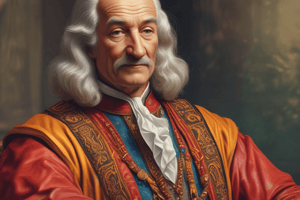Podcast
Questions and Answers
According to John Locke, what is the true state of nature for man?
According to John Locke, what is the true state of nature for man?
- Man is a social animal and works together for the better of society
- Man is naturally evil, greedy and selfish
- Man is naturally peaceful (correct)
- Man lives in continual fear and danger of violent death
According to Thomas Hobbes, what is the true state of nature for man?
According to Thomas Hobbes, what is the true state of nature for man?
- Man lives in continual fear and danger of violent death (correct)
- Man is naturally evil, greedy and selfish
- Man is naturally peaceful
- Man is a social animal and works together for the better of society
According to John Locke, why do people give up their right to take revenge and give it to the government?
According to John Locke, why do people give up their right to take revenge and give it to the government?
- To resolve conflicts
- To create a just society
- To protect natural rights (correct)
- To define what belongs to someone and what doesn't
According to Thomas Hobbes, why do people need a government?
According to Thomas Hobbes, why do people need a government?
According to John Locke, what do people naturally know?
According to John Locke, what do people naturally know?
What is Hobbes's view on natural rights?
What is Hobbes's view on natural rights?
What is Locke's view on natural rights?
What is Locke's view on natural rights?
What do people concede to the government in return for their safety, according to the text?
What do people concede to the government in return for their safety, according to the text?
Why does society give up its natural rights to the government?
Why does society give up its natural rights to the government?
What is the role of the sovereign, or government, according to Hobbes?
What is the role of the sovereign, or government, according to Hobbes?
Flashcards are hidden until you start studying
Study Notes
Views on State of Nature
- John Locke perceives the state of nature as a peaceful and cooperative existence, where individuals are generally rational and moral.
- Thomas Hobbes depicts the state of nature as a chaotic and violent condition, where life is "solitary, poor, nasty, brutish, and short."
Giving Up Rights to Government
- Locke argues that people relinquish their right to take revenge to avoid constant conflict and ensure fairness, transferring this right to the government for the sake of order and justice.
- Hobbes believes that individuals need a government to escape the anarchy of the state of nature, creating a structured and secure environment.
Knowledge in State of Nature
- According to Locke, individuals innately understand the principles of justice and morality, allowing them to navigate the state of nature without constant conflict.
Natural Rights Perspectives
- Hobbes views natural rights as absolute freedoms that individuals possess, yet believes they must relinquish these rights for security and stability under a sovereign.
- Locke asserts that natural rights are inherent and inalienable, including the rights to life, liberty, and property, which the government must respect and protect.
Concessions to Government
- People concede certain freedoms and rights to the government in exchange for protection and maintenance of social order, ensuring safety and prosperity.
Role of the Sovereign
- Hobbes sees the sovereign as an absolute authority responsible for maintaining peace and preventing civil disorder, with the power to enforce laws and dictate behavior.
- The government acts as a mediator of conflicts and a guardian of the social contract between the sovereign and its subjects.
Studying That Suits You
Use AI to generate personalized quizzes and flashcards to suit your learning preferences.




